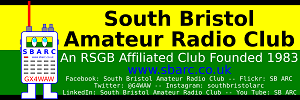You are encouraged to share this post with your friends, acquaintances, colleagues and family by all channels available to you.
News posts, such as this, published on the SBARC website are reposted via a number of other channels including social media feeds and our Groups.io mailing lists. These external services may alter the formatting or layout of the original News Post. If you want to see this News Post in its original form please visit the SBARC website News page and follow the link or links to the story or stories of your choice.

Yes, we’ve joined Bluesky
Read on for more background. But before you do; sign up to Bluesky and follow us please
Not such a long time ago, and definitely in this galaxy, the World Wide Web was a straightforward place; websites were static and Social Media was just a twinkle in Mark Zuckerberg’s eye! Fast forward to the present day and webpage technology has shifted to dynamic content rendered on mobile devices, embedded machines, consoles, computers, smart TVs as well as laptops and PCs. More importantly, or disastrously depending on your point of view, Social Media has moved from the province of students to part of everyday life.
The Club has had a web presence for as long as I can remember. Over that time Steve G0UQT has managed the transition from a static page structure to a custom themed Content Management System (CMS) backed site to a commercial themed CMS backed system allowing a dynamic site compatible with most devices.
We have also had Social Media accounts although these have seen less traffic and interaction. Social Media, however, is slightly more volatile than the web and platforms come and go. For example; who remembers: MySpace, Bebo or Google+?
The Club has had various Social Media presences over the years, as follows:
- Buffer – A spin off of the main subject of this post, we don’t expect much interaction with this, and it is essentially a link to our website.
- Facebook – Our Facebook presence is essentially a mirror of the posts section of the website thanks to a website plug-in. Although the club can be contacted via Facebook there is an auto-response asking for communication to come via the Club’s general e-mail address. We simply do not have the resources to monitor and attend to all possible routes of communication and enquiry.
- Flickr – Essentially Flickr is a photo/video repository. Although we have an account here it is primarily as a storage location for Club photographs. When the account was first created it offered essentially unlimited storage, although it now has a 500 photo limit. We are some way from reaching that limit despite having photos from as far back as 2006. Worth looking through to see who you recognise!
- Google+ – An ill fated attempt by Google to break into the Social Media market, this particular project has joined the ranks of “things Google scraped“. As a G-Suite using organisation integration with Google+, when it was active, was relatively straight-forward and, therefore, our participation was something of a “no brainer”. The system is no longer available and we no longer have access to any of the data from this period, although thanks to back-ups nothing of importance has been lost.
- Groups.io – Groups.io is an email based mailing list. Getting interaction with this has been like pushing water uphill! There are two mailing lists, a public one open to anyone to join and a private members only list which is conditional on paid up membership of the Club. The benefits of a mailing list are the ability for everyone to be able to share emails and discuss or propose Club projects without possessing the email addresses of all other members, which helps the Club with its GDPR compliance. Of course this only works if everyone is signed up to the mailing list. A mailing list, in the opinion of the Management Team, is preferable to a messaging app as it doesn’t require everyone to be signed up to one particular eco-system, and offers significant advantages over “instant messaging” approaches to communication as follows:
- Email Communication Is Asynchronous – Unlike real-time (synchronous) chats or instant messaging, email group members are not forced to be online all at the same time. The asynchronous nature of email has several advantages, especially for larger, distributed groups. Tethering remote members to your organisation’s communication tools undermines their ability to get things done. Instead of trying to recreate the real-time interactions of meetings, the organisation should be doing what remote companies have been doing for years: embracing asynchronous communication.
- Asynchronous communication means more dedicated time to solve problems. When everyone is expected to be available at any point, the cost of interrupting someone and getting an immediate answer is lower than looking for an answer yourself although the cost to the person interrupted is much higher.
- It works better for more loosely coupled groups, such as a Club. It works better for larger groups. Studies agree: Research by Harvard Business School associate professor Ethan Bernstein and colleagues suggests that “always on” may not be always effective. “Intermittently on” might, instead, be better for complex problem solving … Even though the groups interacted only intermittently, they had an average quality of solution that was nearly identical to those groups that interacted constantly. And yet, by interacting only intermittently, these groups also preserved enough variation to find some of the best solutions, too.
- Email Fosters Thoughtful Communication – Email lends itself to longer, more thoughtful exchanges than chats or instant messaging, which makes for better, more thorough communication. All sorts of eventual bad happens when an organisation begins thinking one-line-at-a-time most of the time … Incomplete thoughts and staccato responses make it really difficult to fully consider a topic and make important decisions especially in a group setting. Imagine being in a meeting where everyone just spoke one line at a time, and people kept interrupting you while you were trying to make your point. Would you ever get anywhere? And wouldn’t it take forever?
- Email Is Universal – If you’re on the Internet, you have email. It is the one universal thing, requiring no new app to be installed. It works over slow Internet links. It works for people with visual impairments. Of course Groups.io has a modern web app, but it isn’t required to participate in groups.
- Instagram – A relatively new account with very little traffic on it at the moment. As we don’t have a lot of media (photos or videos) it is questionable whether this account will be retained.
- LinkedIn – For a period we maintained a presence on LinkedIn promoting our training but this has been a much smaller part of our activities post-COVID so the account has been closed.
- NextDoor – It was thought that having a presence on a platform that was supposed to be focussed on a local area would be beneficial. However the complexity of setting up a Club account and identifying ourselves proved to be more trouble than it was worth so the creation was shelved.
- Twitter (sorry, X) – We’ve had a presence on Twitter (sorry, X) since before Elon took control. Its short format limited character count has led to it being used more than other platforms. However, since Elon’s acquisition we have lost functionality, such as auto Tweeting (sorry, posting) our website News posts or displaying our Twitter (sorry, X) feed on the Club website as an indicator of our activity and an inability for people not logged into Twitter (sorry, X) to read our posts which has made use of the platform much harder and one of the reasons for the adoption of BlueSky. We have a fair follower count but it would take a lot of work to genuinely increase this.
- You Tube – Yes, we do have some video content that we have posted publicly. As a G-Suite using organisation we more or less automatically have a You Tube account. Interaction on here is low, we have limited content to post.
Since the American Presidential Election, there has been a strong movement away from Twitter (sorry, X) and many have taken up home on the similar platform Bluesky. Bluesky is close to being a clone of Twitter (sorry, X) and, we believe, has ex-Twitter (sorry, ex-X) people at the helm. At the moment it has quite a sane outlook and is far more open in terms of the API. We’ve replaced the unreliable Twitter (sorry, X) Tweet (sorry, post) feed on the Club website with a much more reliable Bluesky feed. We’ve also validated the Club’s web domain giving us a confirmed personality on Bluesky (thanks to Steve G0UQT for updating DNS records and associated web trickery) and replacing the @g4waw.bsky.social user handle with @sbarc.co.uk, however searching for either “G4WAW” or “SBARC” is likely to find our account as the callsign is part of the displayed name.
Although we won’t be closing our Twitter (sorry, X) account down the lack of website integration and the general shift to Bluesky means that it will likely be both easier and more productive to interact with Bluesky than with Twitter (sorry, X), so please come and follow us on Bluesky.



